Last updated on March 7th, 2023 at 11:53 am
Introduction
Cryptocurrency is a digital or virtual currency that utilizes cryptography for secure financial transactions, as well as to verify the transfer of assets. As a medium of exchange for goods and services, it operates independently of a central bank.
Cryptocurrencies are decentralized and operate on a peer-to-peer network, which makes them resistant to interference or manipulation by governments or financial institutions.
The year 2009 saw the creation of Bitcoin, which is now one of the most well-known cryptocurrencies. Since then, numerous other cryptocurrencies have been developed, including Ethereum, Litecoin, and Dogecoin, to name a few. Each cryptocurrency has its own unique features and uses, and their value can vary significantly.
Cryptocurrencies are bought and sold on a cryptocurrency marketplace, also known as a digital currency exchange or cryptocurrency exchange.
Cryptocurrency marketplaces have become increasingly popular in recent years due to their convenience and security. Transactions can be completed quickly and cost-effectively, and personal information is not shared during the process. However, it’s important to note that cryptocurrencies are not regulated by any government or financial institution and are not insured, so there is a level of risk involved.
We will understand what is a Cryptocurrency Marketplace and the best Cryptocurrency marketplaces in this article.
What is a Cryptocurrency Marketplace?
A cryptocurrency marketplace, also known as digital currency exchange, is a platform that allows users to buy, sell, and trade cryptocurrencies. These marketplaces are essential to the cryptocurrency industry, as they provide a way for users to easily exchange their digital assets for fiat currency or other cryptocurrencies.
There are several different types of cryptocurrency marketplaces, including:
- Centralized exchanges,
- Decentralized exchanges,
- Brokerages, and
- Peer-to-peer (P2P) marketplaces.
Each type of marketplace has its own unique features and benefits, and it’s important to understand the differences between them before choosing a marketplace to use.
1. Centralized Exchange (CEX)
Centralized exchanges are the most common type of cryptocurrency marketplace. They are operated by a central authority, typically a company, and act as a middleman between buyers and sellers.
Centralized exchanges are easy to use and often offer a wide variety of cryptocurrencies to trade, but they can be vulnerable to hacks and other security breaches.
2. Decentralized Exchange (DEX)
Decentralized exchanges are similar to centralized exchanges, but they operate on a decentralized network rather than through a central authority. This means that they are not controlled by a single entity, making them more resistant to interference or manipulation.
Decentralized exchanges can be more complex to use than centralized exchanges, but they offer increased security and privacy.
3. Brokerage
Brokerages are another type of cryptocurrency marketplace. They act as an intermediary between buyers and sellers, similar to a stockbroker.
Brokerages often have a more limited selection of cryptocurrencies available to trade, but they can be a good choice for those who are new to the cryptocurrency market and want a more simplified trading experience.
4. P2P Marketplace
P2P marketplaces are a type of cryptocurrency marketplace that allows users to buy and sell cryptocurrencies directly with each other. These marketplaces do not have a central authority and rely on users to facilitate transactions.
They can be a good option for those who want to avoid the fees associated with centralized or decentralized exchanges, but they can be less secure and more vulnerable to fraud.
The 5 Best Cryptocurrency Marketplaces
Some of the most popular and best cryptocurrency markets include Binance, Coinbase, and Bitfinex. Here is a list-
1. Binance
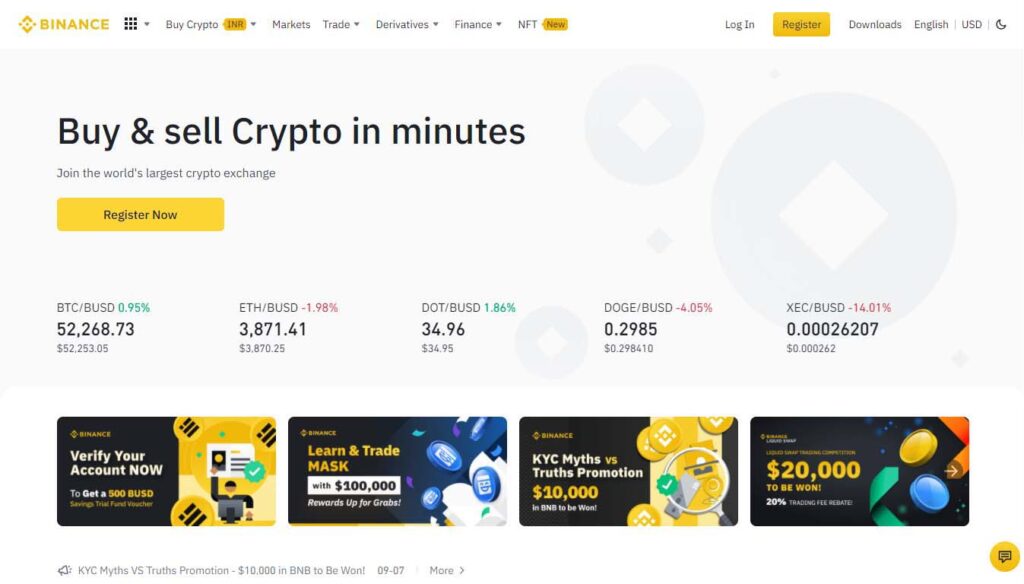
Changpeng Zhao founded Binance, a cryptocurrency exchange, in 2017. It is headquartered in Malta and has offices in various countries around the world, including the United States, Japan, and Singapore. Binance is one of the largest and most popular cryptocurrency exchanges in the world, with a daily trading volume of over $10 billion.
Binance offers a wide variety of cryptocurrency trading pairs, including popular coins like Bitcoin, Ethereum, and Litecoin. It also has a native cryptocurrency, called Binance Coin (BNB). It is used to pay fees on the exchange and can be traded on the platform. Binance offers both spot and margin trading, which allows users to leverage their positions to potentially increase their profits.
One of the key features of Binance is its low fees. It charges a flat 0.1% fee on all trades, which is lower than the fees charged by many other exchanges. It also offers a number of discounts and incentives to users who pay their fees using BNB.
Binance also has a number of other features that make it popular among traders. It also has a referral program that rewards users for inviting their friends to join the platform.
However, there are also a few potential drawbacks to using Binance. Binance has experienced a number of security breaches in the past, including a hack in 2019 that resulted in the theft of 7,000 Bitcoin. While the company has taken steps to improve its security measures since then, these breaches may cause some users to be concerned about the safety of their assets.
2. Bitfinex
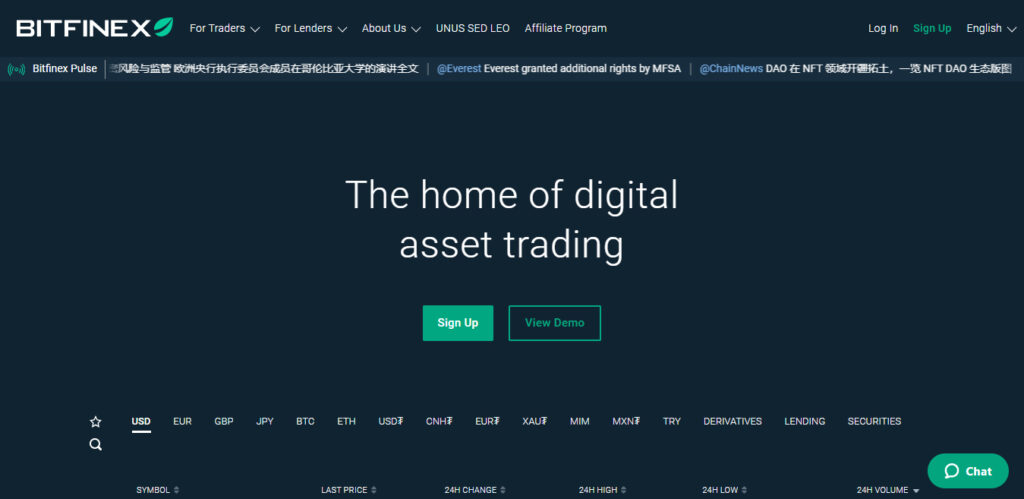
Founded in 2012, Bitfinex is a cryptocurrency exchange. It is headquartered in Hong Kong and is one of the oldest and most well-known cryptocurrency exchanges in the world. Bitfinex is available in over 160 countries and has over 10 million users.
Bitfinex offers a wide variety of cryptocurrency trading pairs, including popular coins like Bitcoin, Ethereum, and Litecoin. It also offers margin trading, which allows users to leverage their positions to potentially increase their profits. In addition to its trading services, Bitfinex also offers a cryptocurrency wallet that allows users to store their digital assets.
One of the key features of Bitfinex is its advanced trading platform, which is suitable for both beginner and experienced traders. It has a number of tools and features, including advanced order types, real-time data, and customizable charts.
In addition to its trading platform and educational resources, Bitfinex also has a number of other features that make it popular among users. Bitfinex also has a number of security measures in place to protect user assets, including two-factor authentication and offline storage for the majority of its digital assets.
However, there are also a few potential drawbacks to using Bitfinex as well. For example, it has experienced a number of security breaches in the past, including a hack in 2016 that resulted in the theft of 120,000 Bitcoin. While the company has taken steps to improve its security measures since then, these breaches may cause some users to be concerned about the safety of their assets. Additionally, Bitfinex charges higher fees than some other exchanges, and it is not available in all countries.
3. LocalBitcoins
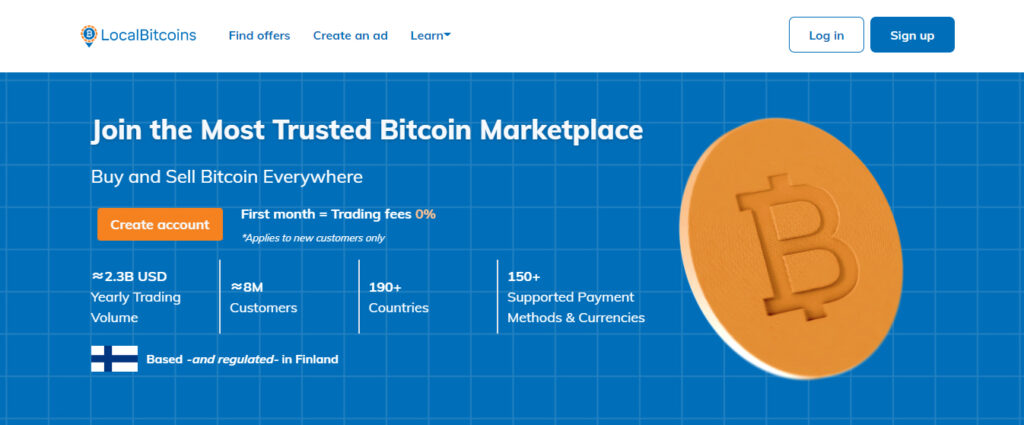
LocalBitcoins is a peer-to-peer (P2P) cryptocurrency marketplace that was founded in 2012. It is headquartered in Helsinki, Finland, and is available in over 200 countries. LocalBitcoins allows users to buy and sell Bitcoin directly with each other, without the need for a central authority.
One of the key features of LocalBitcoins is its global availability. It allows users to buy and sell Bitcoin in countries where it may be difficult do using traditional exchanges.
LocalBitcoins also offers a number of payment methods. Which includes cash, bank transfer, and online payment systems. It makes it easy for users to find a way to buy or sell Bitcoin that is convenient for them.
Another advantage of LocalBitcoins is its privacy and security. Transactions on the platform are anonymous, and users are not required to provide personal information to buy or sell Bitcoin. This can be appealing to users who are concerned about their privacy or the security of their assets.
However, there are also a few potential drawbacks to using LocalBitcoins. For example, it is not regulated by any government or financial institution, which means that there is a higher level of risk involved with using the platform.
Additionally, LocalBitcoins charges higher fees than some other exchanges, and it is not as user-friendly as some other P2P marketplaces. Though to entice beginners it charges a zero fee for the first month.
4. Coinbase
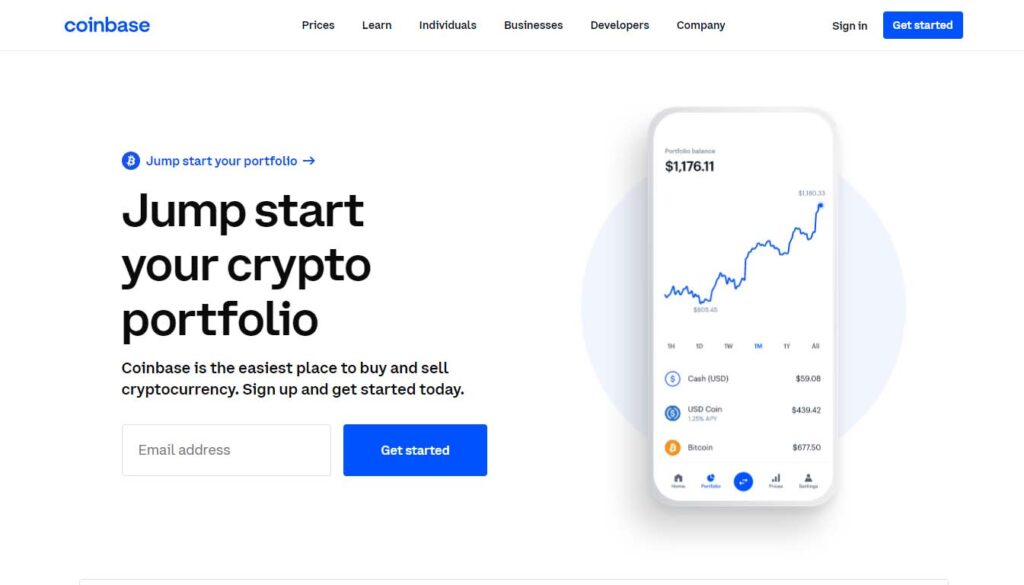
Coinbase is a cryptocurrency exchange and wallet service that was founded in 2012. It is headquartered in San Francisco, California, and is one of the oldest and most well-known cryptocurrency exchanges in the world. Coinbase is available in over 100 countries and has over 35 million users.
Coinbase offers a wide variety of cryptocurrency trading pairs, including popular coins like Bitcoin, Ethereum, and Litecoin. It also offers a number of other services, including a cryptocurrency wallet that allows users to store their digital assets and a platform for merchants to accept cryptocurrency payments.
One of the key features of Coinbase is its user-friendly interface, which makes it easy for both beginner and experienced traders to use. It also has a number of educational resources, including a learning platform called Coinbase Earn that allows users to earn cryptocurrency by completing quizzes and tasks.
In addition to its trading and wallet services, Coinbase also offers a number of other features. For example, it has a mobile app that allows users to trade and manage their assets on the go. It offers a referral program that rewards users for inviting their friends to join the platform. Coinbase also has a number of security measures in place to protect user assets, including two-factor authentication and offline storage for the majority of its digital assets.
However, there are also a few potential drawbacks to using Coinbase. For example, it charges higher fees than some other exchanges, and it has been criticized for its lack of transparency and slow response to customer support requests. Additionally, Coinbase is not available in all countries, and it is subject to regulatory oversight, which may be a concern for some users.
5. Kraken
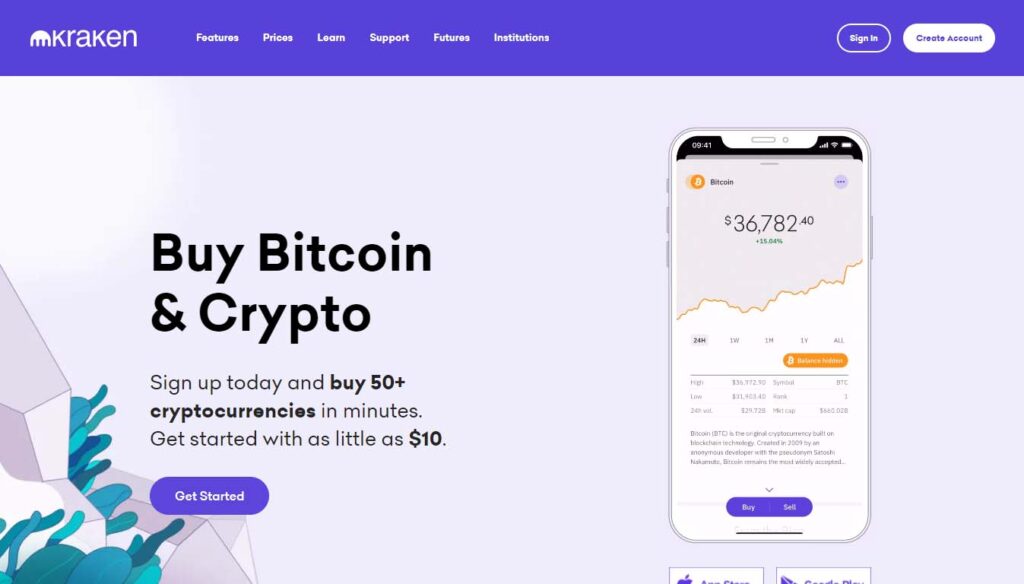
Founded in 2011, Kraken is a cryptocurrency exchange. It is headquartered in San Francisco, California, and is one of the oldest and most well-known cryptocurrency exchanges in the world. Kraken is available in over 190 countries and has over 4 million users.
Kraken offers a wide variety of cryptocurrency trading pairs, including popular coins like Bitcoin, Ethereum, and Litecoin. It also offers margin trading, which allows users to leverage their positions to potentially increase their profits. In addition to its trading services, Kraken also offers a cryptocurrency wallet that allows users to store their digital assets.
One of the key features of Kraken is its focus on security. It has a number of security measures in place to protect user assets, including two-factor authentication and offline storage for the majority of its digital assets. It also undergoes regular security audits to ensure the safety of its systems.
In addition to its security measures, Kraken also has a number of other features that make it popular among users. For example, it has a mobile app that allows users to trade and manage their assets on the go, and it offers a referral program that rewards users for inviting their friends to join the platform. It also has a number of educational resources, including a learning platform called Kraken Academy which offers a variety of educational materials for traders.
However, there are also a few potential drawbacks to using Kraken. For example, it has a reputation for slow customer support, and it has been criticized for its lack of transparency. Additionally, Kraken charges higher fees than some other exchanges, and it is not available in all countries.
Factors to Consider When Choosing the best cryptocurrency marketplaces
When choosing the best cryptocurrency marketplaces, there are a number of factors to consider. These include:
- Security,
- Fees,
- Ease of use,
- Supported cryptocurrencies, and
- Location (for peer-to-peer marketplaces & regulations).
1. Security
Cryptocurrencies are not regulated by any government or financial institution. There is a risk that your assets could be stolen or lost if the marketplace is hacked or experiences other security breaches.
Many investors consider the best cryptocurrency marketplaces to be those with a long track record of stability and security. It’s important to choose a marketplace that has strong security measures in place, such as two-factor authentication and offline storage for digital assets.
2. Fees
Most marketplaces charge fees for their services, and the fees can vary significantly from one marketplace to another. It’s important to compare the fees of different marketplaces to find the one that offers the best value for your needs.
3. Ease of use
Some marketplaces are more user-friendly than others, and it’s important to choose one that is easy to navigate and understand. This can be especially important for beginner traders who may not be familiar with cryptocurrency trading.
4. Supported Cryptocurrencies
Some marketplaces offer a wide variety of cryptocurrencies to trade, while others may only offer a limited selection.
When choosing the best cryptocurrency marketplaces, it is important to consider your specific trading goals and needs. It’s important to choose a marketplace that offers the cryptocurrencies you are interested in trading.
5. Location
P2P marketplaces allow users to buy and sell cryptocurrencies directly with each other. So the location of the seller can affect the availability and convenience of the trade. It’s important to choose a P2P marketplace that has a large user base in your location.
Conclusion
The cryptocurrency marketplaces offer a convenient way to buy and sell cryptocurrencies. Which makes it easier for people to access and trade digital assets. These marketplaces can be centralized exchanges, decentralized exchanges, brokerages, or peer-to-peer (P2P) marketplaces.
Centralized exchanges are operated by a single entity and facilitate trades between buyers and sellers. Decentralized exchanges are built on blockchain technology and do not have a central authority controlling the platform.
Regardless of the type of marketplace, it’s important to do your research and choose a reputable and secure marketplace. It’s important to choose a marketplace that has strong security measures in place. You should also research the marketplace’s history of security breaches and its current security policy.


